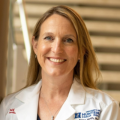
Modeling metastatic breast cancer to advance therapeutic strategies Prof Alana Welm (University of Utah) presents her work on modeling breast cancer. Hosted by Dr Andy Holding.
Event details
Online seminar registration is now open - see the Eventbrite here.
Abstract
Patient derived xenografts (PDX) are valuable, clinically-relevant models of cancer. Their close genomic, phenotypic, and temporal association with patient tumors makes them well-suited for pre-clinical and co-clinical studies that assess the potential of new therapeutics. However, PDX models are not amenable to large-scale drug sensitivity studies or real-time precision oncology due to their relatively slow growth, high cost, and low throughput. To address this, we established and characterized organoid lines from breast cancer patient tumors and PDXs and evaluated their fidelity to the original tumors and their utility in high-throughput therapeutic studies. Results of comparisons between in vitro and in vivo patient-derived models of breast cancer will be presented, along with extension of this technology to inform patient care in an IRB-approved study of precision oncology. Our work demonstrates that breast cancer organoid models are a powerful parallel resource to PDX models, especially useful for efficient determination of drug responses, and are amenable to informing real-time patient care in a functional precision oncology setting.
About the speaker

Professor Alana Welm
Alana Welm, PhD, is Senior Director of Basic Science at the Huntsman Comprehensive Cancer Center, Full Professor in the Department of Oncological Sciences at the University of Utah, and an Investigator at the Huntsman Cancer Institute. Welm's laboratory studies breast cancer metastasis.
Dr. Welm completed her PhD in Cell and Molecular Biology at Baylor College of Medicine in Houston, TX under the supervision of Gretchen Darlington, PhD. She then went on to conduct postdoctoral training in Dr. J. Michael Bishop’s laboratory at the University of California, San Francisco where her work focused on developing new models of breast cancer metastasis. Dr. Welm started her laboratory at the University of Utah’s Huntsman Cancer Institute in 2007, was promoted to Associate Professor with tenure in 2013, and granted Full Professorship in 2019.
The research in Dr. Welm’s laboratory is focused on solving the problem of breast cancer metastasis using in vivo modeling of mouse and human breast cancers. Dr. Welm’s group discovered that the Ron kinase pathway is an important facilitator of breast cancer metastasis through its unique dual function in tumor cells and in resident macrophages. Current areas of research include (1) pre-clinical studies of various Ron inhibitors for treatment and prevention of metastatic breast cancer; (2) pre-clinical and early clinical studies of Ron/Met inhibitors in bone metastatic cancers; (3) discovering molecular mechanisms by which Ron kinases promote metastasis through cell-autonomous and non cell-autonomous pathways; and (4) refining “precision medicine” for metastatic breast cancer using functional assays in patient-derived breast tumor grafts.